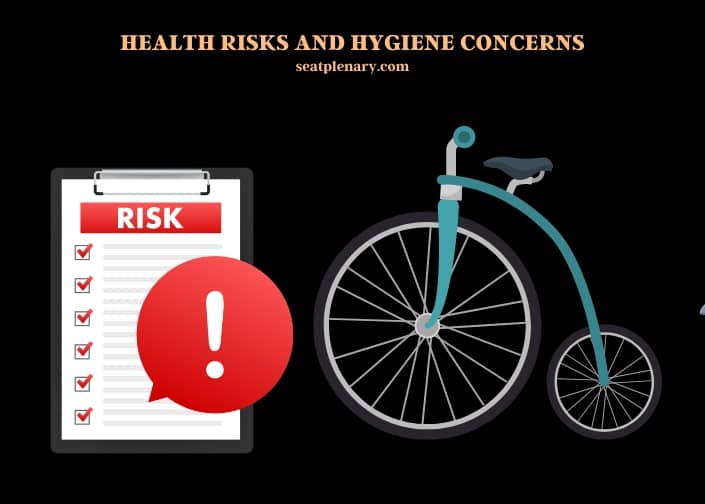Sniffing a bicycle seat is often linked to a behavior known as olfactophilia, a paraphilia where individuals derive sexual pleasure from smells. This specific act, however, is generally considered inappropriate and invasive.
The act of sniffing bicycle seats, while unusual and socially frowned upon, can be attributed to a psychological condition. Olfactophilia is a paraphilia where individuals find sexual arousal in smells. In some cases, this can lead to behaviors like sniffing bicycle seats. It’s important to note that such actions are generally deemed inappropriate and invasive, as they violate personal boundaries and privacy.
This behavior is not only socially unacceptable but also raises concerns about hygiene and health. Bicycle seats can harbor a variety of bacteria and germs, making the act of sniffing them potentially harmful. It’s crucial to respect others’ personal space and property, and this behavior crosses those boundaries.

The psychological aspects behind such actions is vital. It’s often a manifestation of deeper psychological issues that require professional attention. Engaging in such behavior can be a sign of underlying mental health challenges that need to be addressed.
For those interested in learning more about the psychological underpinnings of such behaviors and the importance of addressing mental health issues, a detailed article is available below. This article offers insights into the complexities of human behavior and the significance of mental health awareness.
Why Would You Sniff Bicycle Seat?
The Psychology Behind Olfactophilia
Defining Olfactophilia
Olfactophilia is a type of paraphilia where individuals find sexual arousal in specific smells. It’s a rare but recognized condition in the realm of psychological studies. This condition can lead to unusual behaviors, including the act of sniffing bicycle seats. It’s fascinating to see how the human brain associates certain sensory experiences with sexual pleasure.
Psychological Factors Leading to Unusual Behaviors
The human mind is complex, and the reasons behind certain behaviors can be deeply rooted in psychological factors. In the case of olfactophilia, the sensory stimulation from specific smells triggers sexual arousal. This can stem from past experiences or deep-seated psychological conditions. Understanding these factors is key to demystifying such behaviors and offering appropriate support.
Social and Ethical Considerations
Invasion of Privacy and Social Norms
Sniffing a bicycle seat is not just unusual; it’s a breach of personal boundaries. It’s crucial to respect others’ privacy and adhere to social norms. This behavior crosses a line, making it not only socially unacceptable but also ethically questionable. It’s a reminder of the importance of understanding and respecting social boundaries.
Public Perception and Reactions
Let’s talk about how society views such actions. A survey on public opinion might reveal a range of reactions, from confusion to outright disapproval. These actions can significantly impact both the community and the individual’s reputation. It’s a clear indication of how our actions can affect how we are perceived in society.
Health Risks and Hygiene Concerns

Bacteria and Germs on Bicycle Seats
| Bacteria Type | Commonly Found On | Potential Health Risks |
| E. coli | Public Seats | Gastrointestinal issues |
| Staphylococcus | Gym Equipment | Skin infections |
| Candida | Moist Surfaces | Skin and yeast infections |
Bicycle seats can be a breeding ground for bacteria and germs. From E. coli to Staphylococcus, these microorganisms pose various health risks. It’s a stark reminder of the importance of hygiene, especially in public spaces.
The Importance of Hygiene in Public Spaces
Hygiene in public spaces is something we often take for granted. But it’s essential for our health. Public spaces like parks and gyms need regular cleaning to prevent the spread of germs. As individuals, we also have a role to play in maintaining these standards for our collective well-being.
Legal Implications and Law Enforcement
Laws Regarding Inappropriate Behaviors in Public
Different regions have varying laws regarding public decency and behavior. In many places, actions like sniffing a bicycle seat could lead to legal consequences. It’s a reminder that our actions not only have social but also legal implications.
Law Enforcement Responses and Actions
Law enforcement agencies take these matters seriously. There have been cases where individuals engaging in such behaviors faced legal actions. These cases serve as examples of the legal system’s role in maintaining public decency and safety.
Treatment and Counseling for Paraphilic Disorders
Approaches to Treatment
Treating paraphilic disorders like olfactophilia involves a range of approaches. From psychological counseling to therapy, there are several options available. These treatments aim to address the underlying causes and help individuals lead healthier lives.
Support Systems and Resources
| Resource Type | Description | Contact Information |
| Counseling Centers | Professional mental health services | [Local Directory] |
| Online Support Groups | Communities for sharing experiences | [Online Platforms] |
| Educational Materials | Information on paraphilic disorders | [Health Websites] |
Support is crucial for those dealing with paraphilic disorders. From counseling centers to online support groups, there are resources available to help. These platforms provide a safe space for individuals to seek help and learn more about their conditions.
Public Awareness and Education
Educational Programs on Mental Health and Sexual Behaviors
Raising awareness about mental health and sexual behaviors is vital. Educational programs play a key role in this, helping to break down stigmas and promote understanding. These initiatives can lead to a more informed and empathetic society.
Role of Media and Society in Shaping Perceptions
The media has a powerful influence on how we perceive unusual behaviors. By portraying these issues responsibly, the media can help shape a more understanding and informed society. It’s about creating a narrative that is both informative and respectful.
Frequently Asked Questions
Is Sniffing Bicycle Seats a Common Behavior?
Sniffing bicycle seats is not a common behavior. It’s seen as an outlier in terms of social conduct. Most people do not engage in this activity due to its invasive nature and the social stigma attached to it. It’s considered a breach of personal space and is generally frowned upon in society. This behavior is often linked to specific psychological conditions or paraphilias, which are relatively rare. Therefore, it’s not something that is widely practiced or accepted in any culture or community.
Can Sniffing Bicycle Seats Lead to Addiction?
Sniffing bicycle seats is unlikely to lead to addiction in the traditional sense. Addiction is typically associated with substances that cause chemical changes in the brain, leading to physical dependence.
In the context of paraphilic disorders, a person might develop a compulsive behavior towards a specific stimulus, such as a smell. This compulsion can be psychologically similar to addiction, where the individual feels a strong, often uncontrollable urge to engage in the behavior despite potential negative consequences.
Are There Cultural Differences in Perceptions of This Behavior?
Cultural perceptions of sniffing bicycle seats vary significantly. In many cultures, this behavior is seen as taboo and socially unacceptable. It’s often viewed as a violation of personal space and decency.
Cultural norms and attitudes towards sexual behaviors and paraphilias can differ. Some societies might be more open or less judgmental about unusual sexual behaviors, while others may have strict social norms and legal regulations against such actions. It’s important to consider these cultural differences when discussing or addressing this behavior.
What Are the Emotional Impacts on the Individual Involved?
The emotional impact on individuals who engage in sniffing bicycle seats can be complex. They might feel a sense of shame or guilt due to the social stigma associated with the behavior. There can also be feelings of isolation or confusion, especially if they struggle to control their impulses. On the other hand, if the behavior is linked to a paraphilic disorder, they might experience temporary satisfaction or relief from engaging in the act. Understanding these emotional aspects is crucial for providing appropriate psychological support.
Can This Behavior Be a Sign of a Deeper Psychological Issue?
Sniffing bicycle seats can be indicative of deeper psychological issues. It might be associated with paraphilic disorders, where individuals have atypical sexual interests. In some cases, it could be linked to past trauma or a manifestation of unresolved psychological conflicts. It’s essential to approach this behavior with sensitivity and consider a psychological evaluation to identify any underlying issues that may require professional attention.
What Role Does Education Play in Addressing This Behavior?
Education plays a significant role in addressing behaviors like sniffing bicycle seats. By providing information about paraphilic disorders, mental health, and social norms, education can help demystify and destigmatize such behaviors. It can also promote understanding and empathy towards individuals who struggle with these issues. Educational programs can teach the importance of respecting personal boundaries and the impact of our actions on others. Through education, we can foster a more informed and compassionate society.
In this article, we’ve looked at the multifaceted issue of sniffing bicycle seats from psychological, social, health, and legal perspectives. It’s a complex topic that touches on mental health, societal norms, hygiene concerns, and legal implications. By understanding these aspects, we can foster a more informed and empathetic society that respects individual boundaries and promotes mental health awareness.
Read more:
